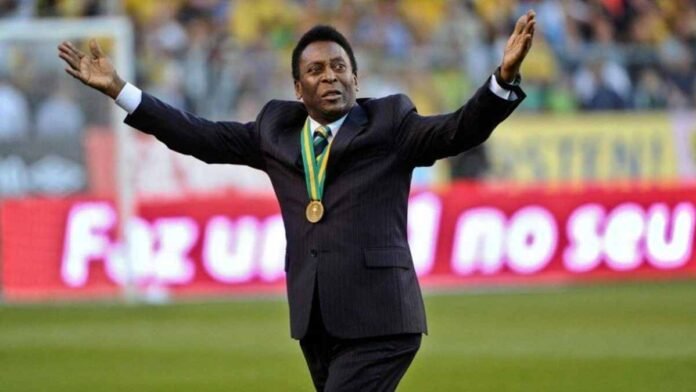Pele, the legendary Brazilian footballer who climbed from barefoot poverty to become one of the greatest and most well-known athletes of all time, died on Thursday at the age of 82 in Sao Paulo. He has been in and out of the hospital in recent months after a tumour on his colon was discovered.
Pele, born Edson Arantes do Nascimento, set a global record with 1,281 goals and is the only player to win the World Cup three times.
He helped establish football the world’s most popular sport with magnificent talents and a captivating grin, and he captivated popes, presidents, and Hollywood stars throughout a seven-decade career as a player and advocate for the sport.
He learnt the game from his father, a semi-professional player whose promising career was cut short by a knee injury, who was born on October 23, 1940, in the tiny Minas Gerais town of Tres Coraçes. Myths obfuscate some parts of his boyhood, including the origin of his renowned moniker.
According to Pele (on occasion), he frequently played goalkeeper in neighbourhood sports, and youngsters began comparing him to a local player named “Bile” – and the letters were twisted over time.
Whatever the reality was, he rapidly wowed scouts as an attacking striker rather than a goalie – a prototype number 10. Pele was admired for his versatility, and more than any other player before or after, he could do it all: he was two-footed, had amazing pace and stamina, could head, pass, tackle, and, of course, score goals.
He joined Santos at the age of 15 and transformed the little coastal club into one of football’s most recognisable names.
During his 18-year tenure with the club, he won every Brazilian football award, as well as two Copa Libertadores (the South American counterpart of the Champions League) and two Intercontinental Cups (the yearly tournament between the top teams in Europe and South America). His potential was quickly noticed by the national team, and he was named to the Brazil squad for the 1958 World Cup in Sweden, despite the fact that a team psychologist deemed him “clearly infantile” and urged against playing him.
At the 1970 tournament in Mexico, a now completely mature 29-year-old Pele won the title for the third time with a Brazil team that included other talents like Carlos Alberto Torres and Tosto, and is often regarded as the best team ever.
“I told myself before the game, ‘He’s made of skin and bones just like everyone else,'” Tarcisio Burgnich, the Italian defender tasked with tracking Pele in the 1970 World Cup final, stated.
“However, I was mistaken.”
Pele resigned in 1974, but after discovering that ill-advised investments had left him bankrupt, he accepted an offer to play in the embryonic North American Soccer League the following year for the then-astonishing amount of roughly $1 million per year. Even seasoned New Yorkers were taken aback by Pele’s magnetism.
He mingled with celebrities and once shared a table at the legendary Studio 54 nightclub with Mick Jagger, Rod Stewart, and Andy Warhol, who referred to Pele as the exception to his rule that everyone will have 15 minutes of fame.
“Pele was one of the few who disagreed with my theory: instead of 15 minutes of fame, he’ll have 15 centuries,” the artist explained.
Even in such company, Pele avoided drink and narcotics, claiming that he needed to safeguard his physique and serve as a role model for children.
He confessed to other “weaknesses,” nevertheless. His two divorces, several relationships, and the two children he acknowledged fathering outside of marriage fostered views of a chasm between the squeaky-clean business pitchman and the elusive real-life Edson.
Pele led the New York Cosmos to the league title in 1977, attracting millions of fans to a sport that had previously appeared unreachable and European.
Years later, when the United States was awarded the privilege to host the 1994 World Cup, the president of the United States Football Federation cited Pele as the “most crucial” reason. According to FIFA’s website, Pele scored 1,281 goals in 1,366 games at a staggering pace of 0.94 goals per game.
Some were friendly matches or games played as part of his military duty, but he was just as successful in official events, scoring 757 goals in 812 games.
Pele had a history of health problems, including hip surgery that left him with persistent discomfort and difficulty walking unassisted. He cut back on public appearances but was active on social media.
Six known children survive Pele. A seventh child, whom he didn’t accept as his own for years, passed away from cancer in 2006.
Pele went on to score a hat-trick in the semi-final against France, as well as two goals in the final against the host Swedish side, to help Brazil win its first-ever championship. Injuries kept him out of all but two games of Brazil’s 1962 World Cup victory.



